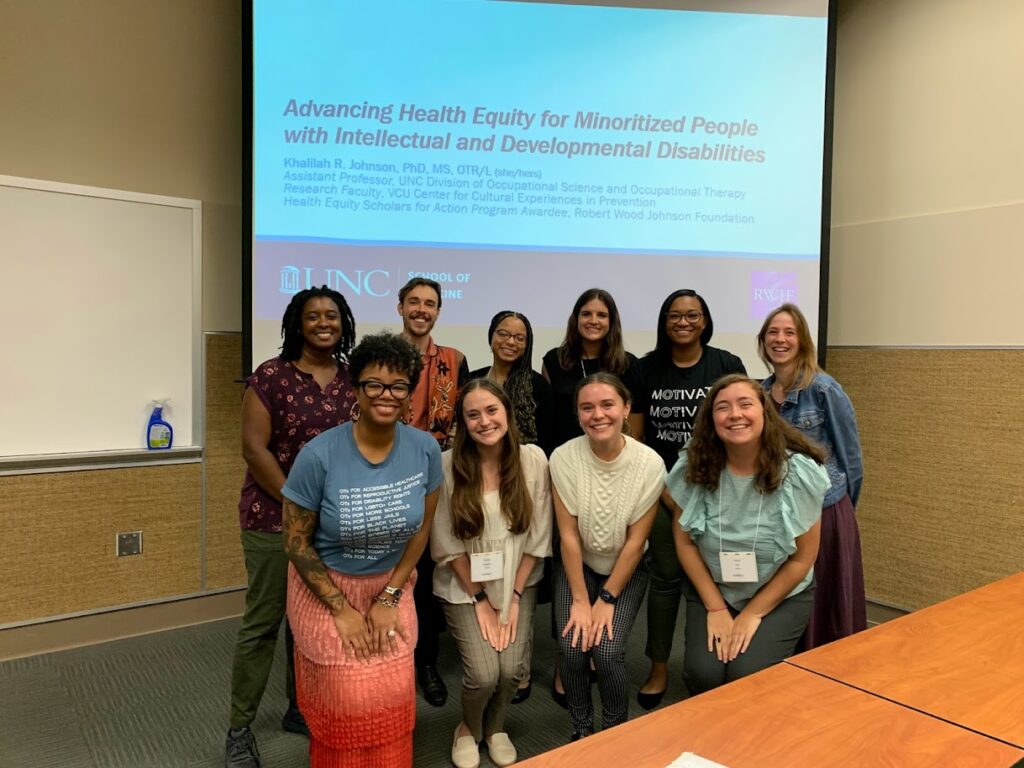Opportunities Beyond the Classroom
We encourage our students to be engaged in opportunities for professional, research, and community service activities that complement and extend beyond academic study. Examples of these types of engagement are described below.
Professional Involvement
Every student is encouraged to become a member of SOTA, the Student Occupational Therapy Association. SOTA is a pre-professional organization focused on community service, professional awareness, and social networking opportunities for current students in the occupational therapy program. For more information: SOTA website.
NCOTA is the North Carolina Occupational Therapy Association, and UNC has a long history of active involvement from faculty, alumni, and students. We encourage students to join NCOTA for the purposes of networking, service to the profession, and continuing education. For more information, visit www.ncota.org.
AOTA, the American Occupational Therapy Association, is the national professional association representing the interests of occupational therapists in all realms of practice. Attendance at annual national conferences keeps practitioners abreast of current clinical, educational, political and legal issues related to the profession, and student memberships are affordable and highly encouraged. For more information, visit www.aota.org.

The Society for the Study of Occupational Science – USAfocuses on research and scholarship in the realm of occupational science, and its translation to clinical applications in occupational therapy. For more information, visit www.sso-usa.org.
The World Federation of Occupational Therapy (WFOT) is the international council that promotes communication between and collaboration among occupational therapists throughout the world. Online networking opportunities and information about occupational therapy organizations worldwide can be found at www.wfot.org.
Community Service
The University of North Carolina at Chapel Hill has a long tradition of community service, and we encourage students in the Division of Occupational Science and Occupational Therapy to carry on this tradition through involvement in various forms of volunteerism. The ways in which students in occupational therapy can be involved in community service include:
- Involvement in SOTA-led service projects
- Volunteering to serve as a Beyond Clinic Walls team member. BCW is a student-led program consisting of interdisciplinary teams that adopt frail older adults in the community and visit them on a regular basis to provide ongoing evaluation of their health, social and emotional status and to provide intergenerational companionship
- Training as a CarFit technician to conduct driver-automobile fitness checks for older adults
- Participating in the Adopt-A-Highway clean-up sessions conducted by the occupational therapy students. This is a 20-year tradition at UNC and recognized by the North Carolina Department of Transportation for their long-term service.
-
Class project and/or practicum with a community organization through the Community Practice Lab to support community-led initiatives on a variety of topics including housing, aging, community engagement, and social equity
Research and Scholarship
Research Projects
Students in the entry-level Master of Science program in occupational therapy undertake as part of their curriculum a research project working with one of our faculty in their area of research. That process involves developing an understanding of both quantitative and qualitative research methods, conducting a literature review, collecting/analyzing data, and communicating research results to a peer audience. This process fulfills the research requirements for the MS degree; a thesis is not required. Students who wish to complete a thesis should discuss this with their academic advisor early in the two-year curriculum.
Opportunities to work on established research projects within the division and the department arise on an occasional basis and are communicated to students via departmental email.
Training Grants
Interdisciplinary training grants are faculty-initiated projects that allow students to deepen their content knowledge in certain areas, and take additional courses with students from other disciplines. Examples of recent training grant opportunities include an autism training grant developed collaboratively between Occupational Science and Speech and Hearing Sciences, and a multicultural interdisciplinary grant focused on helping students learn to address the needs of children from diverse families. Training grant opportunities may or may not be available during the time a student is in the MS program.